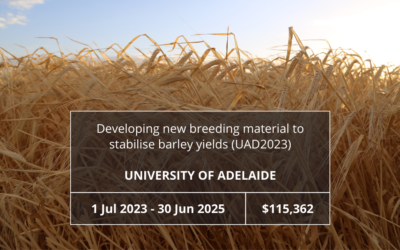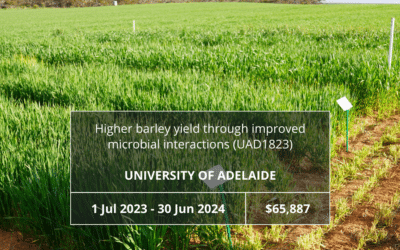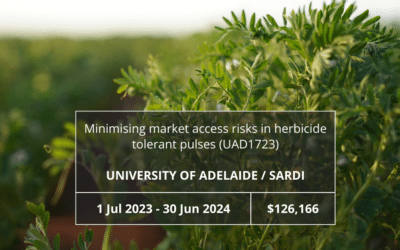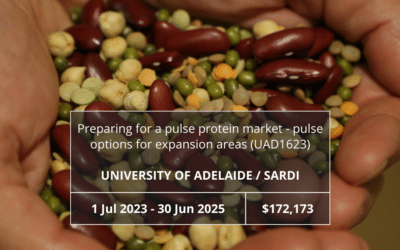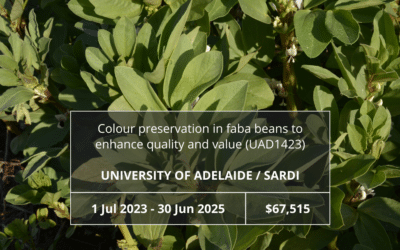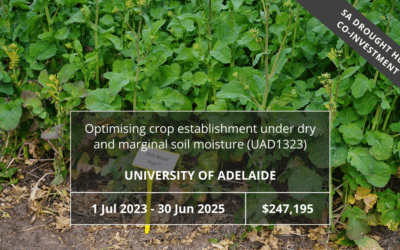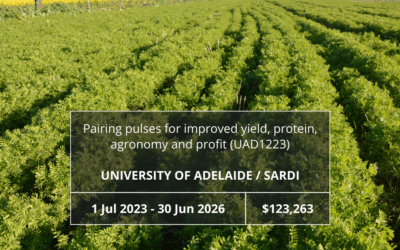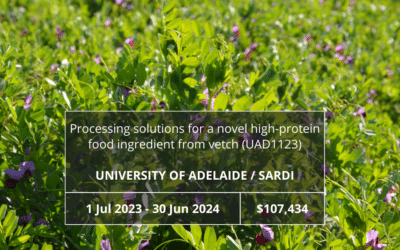South Australian crops can be severely impacted by poor and variable growing conditions, which includes low-fertility soils. Crop plants possess strong instincts to reduce grain number due to variable growing conditions or reduced fertiliser. This is a major contributor to the yield gap in SA. This project seeks to help close this yield gap through the import and testing of new genetic material that makes barley less responsive to environmental conditions.
Latest Blogs - Current Projects
Higher barley yield through improved microbial interactions (UAD1823)
Nov 23, 2023 | Current Projects
The aims of this project are to determine whether Australian barley varieties differ in their effects on the diversity of potentially beneficial soil microbes in the field, and to investigate the genetic control of any observed differences. This will result in growers being able to choose varieties that will benefit soil biological health and provide new molecular tools for breeders to use in selection to develop new varieties with improved soil biological health.
Minimising market access risks in herbicide tolerant pulses (UAD1723)
Nov 23, 2023 | Current Projects
This project will be undertaken by SARDI researchers and aims to exploit natural genetic variation in herbicide metabolism ability to reduce the market access risks associated with chemical residues in herbicide tolerant pulse grain. This project will identify variation in the ability of lentil and faba bean genotypes to metabolise metribuzin and investigate whether herbicide residues are retained or reduced in plant-based protein extraction processes.
Preparing for a pulse protein market – pulse options for expansion areas (UAD1623)
Nov 23, 2023 | Current Projects
This project will be undertaken by SARDI researchers and aims to provide information to growers when considering a pulse protein market in key pulse expansion areas. This will be achieved by evaluating current genetic variation for protein content and seed quality, evaluating the crop choices for different environments, and by conducting an economic analysis.
Colour preservation in faba beans to enhance quality and value (UAD1423)
Nov 23, 2023 | Current Projects
Seed colour is an important quality trait required to meet the highest value export markets for faba bean, with consumers demanding a pale tan colour. Faba beans darken on storage, and storage temperature and moisture both affect this process. This project will be undertaken by SARDI researchers and has three aims: to determine what chemical mechanism is behind the darkening process; to find a low-cost post-harvest treatment able to slow down the darkening; and to look for varietal differences in storage darkening.
Optimising crop establishment under dry and marginal soil moisture (UAD1323)
Nov 23, 2023 | Current Projects
The aim of this project is to improve the effectiveness of dry sowing focusing on wheat and canola. It will conduct experiments at three sites with different rainfalls and soils to examine the effect of sowing practices on establishment at a range of sowing times. The project will explore the ability of remote sensing to measure seedbed moisture content to aid decision making. Controlled environment studies on emergence in different soils and moisture contents will support the field studies.
Pairing pulses for improved yield, protein, agronomy and profit (UAD1223)
Nov 23, 2023 | Current Projects
This project will be undertaken by SARDI researchers and will investigate if the pairing of faba bean and semi-leafless field pea will benefit both crops by increased seed and protein yield; reduced lodging, disease and harvestability issues; and improved yield and reduced N fertiliser cost of the following wheat crop. This system could increase faba bean representation in more marginal areas and increase yield in drier seasons as field pea is better adapted to drier conditions.
Processing solutions for a novel high-protein food ingredient from vetch (UAD1123)
Nov 23, 2023 | Current Projects
Researchers have recently found a way to detoxify vetch via a steeping method. This project will be undertaken by SARDI researchers and aims to develop a low-cost, robust method for physical removal of the β-cyanoalanine toxin from common vetch, and capacity in quantitative analysis of toxin levels, towards including vetch as an alternative feedstock for plant protein production in SA.
Latest Media
- Strategies for mitigating frost damage in the Upper North region (UNF1724)
- An improved and rapid test to inform sodic soil management (UAD4624)
- Increasing pulse yields: focus paddocks to identify and manage soilborne constraints (UAD2624)
- Multi-scale monitoring of pests and beneficial insects in canola cropping (UAD1424)
- The impact of annual ryegrass seed size on harvest weed seed control mill efficacy (TCO6424)

